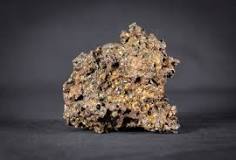The Fascinating World of Meteorites
Meteorites, the remnants of asteroids or comets that survive their fiery journey through Earth’s atmosphere to land on our planet’s surface, have captivated humanity for centuries. These extraterrestrial rocks offer a window into the mysteries of our solar system and beyond.
One of the most intriguing aspects of meteorites is their diversity. They come in various types, such as iron meteorites, stony meteorites, and stony-iron meteorites. Each type provides valuable insights into different processes that occurred during the formation and evolution of our solar system.
Iron meteorites, composed primarily of iron and nickel, are remnants of the cores of ancient asteroids. Their crystalline structures can reveal information about the cooling rates and conditions in space. On the other hand, stony meteorites, made up of silicate minerals like olivine and pyroxene, represent the building blocks of planets and can shed light on early planetary formation.
Stony-iron meteorites are a rare combination of both rock and metal components, offering a unique perspective on the complex processes that shaped celestial bodies in our cosmic neighbourhood.
Besides their scientific value, meteorites also hold cultural significance. Throughout history, these celestial visitors have inspired myths, legends, and awe among different cultures worldwide. Some ancient civilisations even considered them sacred or imbued with mystical powers.
Today, meteorites continue to spark curiosity and fascination among scientists, collectors, and enthusiasts alike. Studying these extraterrestrial rocks not only deepens our understanding of planetary formation but also provides clues about the origins of life in the universe.
Whether displayed in museums, studied in laboratories, or collected by individuals passionate about space exploration, meteorites serve as tangible reminders of the vastness and complexity of our cosmic surroundings. Their silent presence on Earth serves as a reminder that we are all connected to something much larger than ourselves.
So next time you gaze at the night sky or hold a piece of a meteorite in your hands, remember that you are touching a fragment of another world—a testament to the enduring mysteries that lie beyond our terrestrial boundaries.
Top 5 Tips for Exploring the Fascinating World of Meteorites
- Learn about different types of meteorites, such as stony, iron, and stony-iron.
- Visit museums or attend events related to meteorites to expand your knowledge.
- Use a metal detector when searching for meteorites in areas where they are likely to be found.
- Handle meteorites with care to preserve their scientific value and prevent contamination.
- Consider joining a local astronomy club or online forums to connect with fellow enthusiasts and learn more about meteorites.
Learn about different types of meteorites, such as stony, iron, and stony-iron.
To deepen your knowledge of meteorites, it is essential to explore the various types that exist, including stony, iron, and stony-iron meteorites. Each type offers a unique insight into the composition and history of celestial bodies, shedding light on the processes that have shaped our solar system over millions of years. By understanding the characteristics and origins of these different meteorite varieties, you can embark on a fascinating journey through space exploration and planetary science.
Visit museums or attend events related to meteorites to expand your knowledge.
Visiting museums or attending events dedicated to meteorites is a fantastic way to deepen your understanding and appreciation of these extraterrestrial wonders. By exploring curated collections and engaging with experts in the field, you can gain valuable insights into the scientific significance, cultural impact, and historical narratives surrounding meteorites. These experiences not only expand your knowledge but also offer a unique opportunity to connect with others who share your fascination for the mysteries of the cosmos. Whether you’re a seasoned enthusiast or a curious beginner, immersing yourself in the world of meteorites through museum visits and events can be an enriching and inspiring journey of discovery.
Use a metal detector when searching for meteorites in areas where they are likely to be found.
When searching for meteorites in areas where they are likely to be found, using a metal detector can significantly increase the chances of locating these extraterrestrial treasures. Meteorites often contain metallic elements like iron and nickel, making them detectable by metal detectors. By employing this tool during your search, you can enhance your efficiency and precision in identifying potential meteorite specimens hidden beneath the Earth’s surface. This method not only saves time but also adds a layer of excitement to the exploration process as you uncover these cosmic remnants with the aid of modern technology.
Handle meteorites with care to preserve their scientific value and prevent contamination.
When handling meteorites, it is crucial to exercise caution and care to preserve their scientific value and prevent contamination. These extraterrestrial rocks hold valuable information about the origins of our solar system and must be treated delicately to maintain their integrity. By handling meteorites with care, we ensure that researchers can study them effectively and uncover the secrets they hold, contributing to our understanding of the universe’s mysteries.
Consider joining a local astronomy club or online forums to connect with fellow enthusiasts and learn more about meteorites.
Consider joining a local astronomy club or online forums to connect with fellow enthusiasts and expand your knowledge about meteorites. Engaging with like-minded individuals who share your passion for space and celestial objects can offer valuable insights, discussions, and opportunities to explore this fascinating field together. By joining these communities, you can not only enhance your understanding of meteorites but also build lasting connections with individuals who share your curiosity and enthusiasm for the wonders of the universe.

